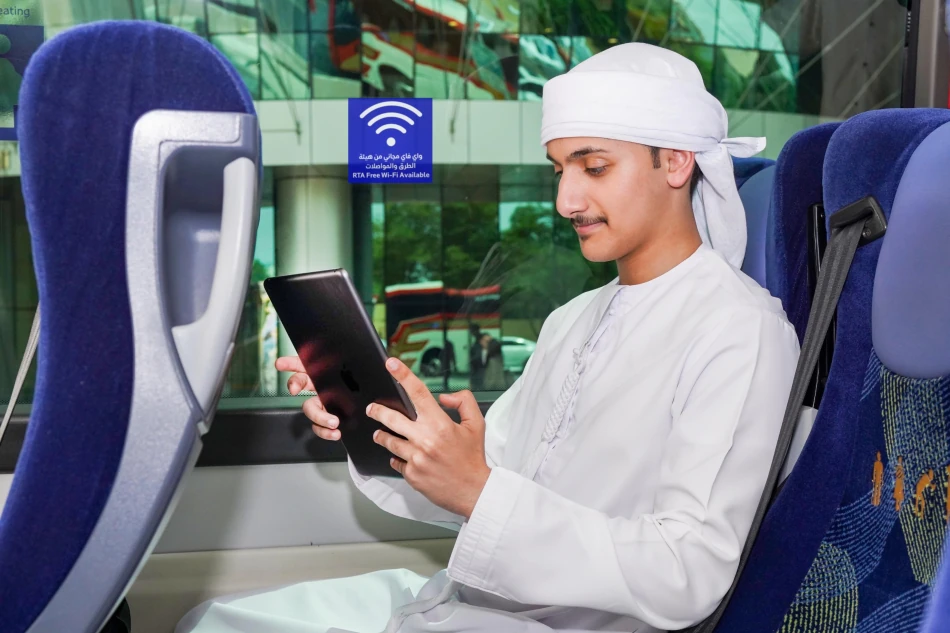
Dubai's Public Transport Now Offers Free WiFi on All City Buses
Dubai's Smart City Push: Free Wi-Fi Rollout Across Inter-City Buses Signals Major Digital Infrastructure Investment
Dubai's Roads and Transport Authority (RTA) has completed the installation of free wireless internet across all 259 inter-city buses, partnering with telecommunications provider Etisalat (e&) to enhance connectivity for daily commuters traveling between Dubai and other UAE emirates including Sharjah, Abu Dhabi, Ajman, and Fujairah. This infrastructure upgrade represents a significant step in the emirate's broader digital transformation strategy and its ambition to become the world's smartest and happiest city.
Beyond Basic Connectivity: A Strategic Digital Infrastructure Play
The Wi-Fi rollout enables passengers to maintain internet access through smartphones, tablets, and laptops during inter-emirate travel, ensuring business continuity and general web browsing capabilities. However, this initiative extends far beyond passenger convenience—it positions Dubai as a leader in integrated smart city infrastructure across the Gulf region.
The timing is particularly strategic. As remote work and digital nomadism continue reshaping urban mobility patterns post-pandemic, cities worldwide are recognizing that seamless connectivity during transit is no longer a luxury but an economic necessity. Dubai's move mirrors similar initiatives in Singapore's smart nation program and South Korea's ubiquitous computing infrastructure, where public transport connectivity drives broader economic productivity.
Regional Competition and Economic Implications
Setting the Regional Standard
This deployment puts Dubai ahead of regional competitors in public transport digitization. While Saudi Arabia's NEOM project promises futuristic connectivity and Qatar invested heavily in transport infrastructure for the 2022 World Cup, Dubai's systematic approach to existing transport networks demonstrates a more pragmatic path to smart city implementation.
The partnership with Etisalat also strengthens the UAE's domestic telecommunications ecosystem, reducing reliance on international connectivity providers and potentially lowering operational costs for future digital infrastructure projects.
Business and Investment Perspective
For investors and businesses, this development signals Dubai's commitment to maintaining its position as the Middle East's primary business hub. Reliable inter-emirate connectivity supports the UAE's federal economic model, where businesses often operate across multiple emirates. Enhanced digital infrastructure reduces friction costs for commerce and supports the country's economic diversification away from oil dependence.
The initiative also creates data collection opportunities that could inform future transport planning and smart city investments, though privacy frameworks will need careful consideration as the system scales.
Technical Implementation and Future Expansion
The RTA has committed to continuous evaluation and expansion of the service in collaboration with Etisalat, suggesting this initial rollout serves as a pilot for broader connectivity initiatives. The mention of extending services to marine transport indicates Dubai's intention to create comprehensive connectivity across all public transport modes.
This systematic approach reflects lessons learned from other global implementations. Cities like Barcelona and Amsterdam discovered that piecemeal connectivity upgrades create user confusion and technical inefficiencies, while comprehensive rollouts generate network effects that justify infrastructure investments.
Alignment with National Digital Strategy
The project directly supports the UAE's National Digital Government Strategy, positioning local transport improvements within a broader federal framework. This alignment suggests potential for scaling similar initiatives across other emirates, creating a unified digital infrastructure that could attract international businesses seeking seamless operational environments.
As Dubai prepares to host Expo 2025 and continues attracting global talent through various visa programs, transport connectivity becomes a crucial differentiator in the competitive landscape of international business destinations. The Wi-Fi rollout may seem incremental, but it represents the kind of systematic infrastructure investment that sustains long-term economic competitiveness in an increasingly digital global economy.
Most Viewed News

 Sara Khaled
Sara Khaled






